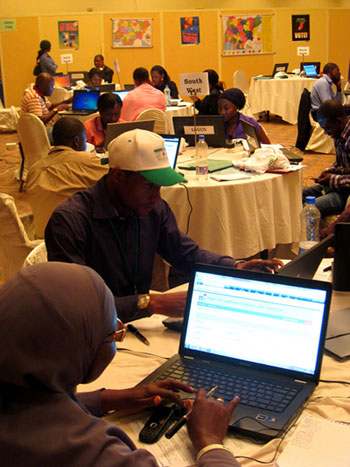Practice Makes Perfect, or How We Fail Early and Succeed Late

Ahead of the intense effort and coordination involved with PVT-type data collection on an Election Day, organizations choose to simulate the reporting and data management processes which will be required in a tense political environment.
In massive data collection exercises, “stress” or “load” tests can assess the training and commitment of the observers, the effectiveness of the communications system and the training (video!) of staff in the center.
Last week, ahead of the first round of elections in Nigeria (National Assembly Elections), Project Swift Count (PSC ) undertook the first of three simulation exercises, wherein all 798 LGA Supervisors and 7,114 Observers were to send in a sample text message. As with most simulations, this one revealed problems and potential threats, thereby initiating immediate fixes as well as longer term back-up measures.
Some of the technology and communications threats included:
Inconsistent internet access– While three internet service providers were planned for, one was still being configured after deadline, a second did not maintain a consistent signal, and while a third proved successful, it did not attain a significant bandwidth.
Mobile phones deactivated – PSC purchased dozens of toll-free mobile phones to equip a calling center with a data entry clerk assigned to every state. However, for some reporting periods, many of the phone lines were disabled by the service provider.
SMS aggregator weaknesses – SMS gateway providers (aggregators) facilitate SMS traffic between a client and mobile subscribers, often including mission-critical SMS. Clients can pay for various levels of messaging performance, and often are dependent on the aggregator to transfer intended messages at an appropriate speed. Any delays on the part of the aggregator can negatively affect outcomes.
External Threats – A recent story in a local newspaper (Punch) claimed that texting and the use of GSM phones would be limited on Election Day, to prevent groups from announcing results. A similar rule was reversed in Kenya the day before the 2010 Constitutional Referendum. There have yet to be any reports by observers of this rule being enforced.
Despite these and other challenges, Project Swift Count received over 65% of its expected data on the 1st Simulation Day. They now have 12 days to improve on their statistics ahead of the Presidential Election – this period includes a second round of trainings for observers, two more nationwide simulations, and the National Assembly elections.
Find further updates on the changing political situation at the PSC blog – blog.pscnigeria.org.
